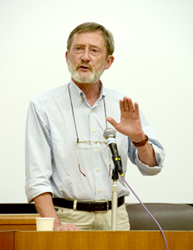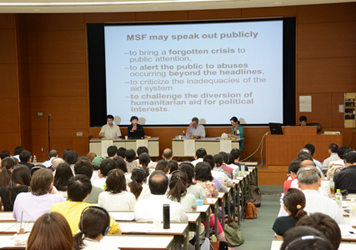国際シンポジウム「ルワンダのジェノサイドと国際協力
~残虐行為と難民流出をどう予防すべきか~」

立教大学、明治大学、国際大学「国際協力人材」育成プログラム主催
「世界難民の日」国際シンポジウム「ルワンダのジェノサイドと国際協力
~残虐行為と難民流出をどう予防すべきか~」
2014年6月20日 18:20~21:00
立教大学
 |
 |
基調講演をされた
フィリップ・レインツエンス先生 |
パネルディスカッション |
動画コンテンツ
シンポジウムの模様はこちら




報告書
シンポジウムの報告書はこちら(PDF形式でダウンロード可)

2014年は、20世紀最悪と呼ばれたルワンダのジェノサイド、そして最悪の難民危機となったルワンダ難民の大量流出から20周年を迎える。この機会に、難民、国内避難民やルワンダに帰還した元難民(帰還民)の視点から、ジェノサイドの文脈やそれがアフリカ大湖地域に与えた影響について分析する。その上で、将来、ルワンダやその他の国々における残虐行為を予防し、持続的な平和を目指すために、国際社会がどのような国際協力に従事すべきかについて議論する。
アフリカ中央部、特にルワンダの法律や政治を専門とする、世界を代表する研究者、フィリップ・レインツェンス教授(ベルギー・アントワープ大学)が基調講演を行う。映画「ホテル・ルワンダ」の影響もあり、ジェノサイド、民族対立や和解などに関心を持つ数多くの研究者や学生にとって、難民、開発、ガバナンスや平和構築の理論と現実のギャップを学ぶ、重要な機会となるものである。
Organized by Rikkyo University, Meiji University and International University of
Japan’s “Human Resource Development Program for International Cooperation”
International Symposium on World Refugees Day
“Rwandan Genocide and International Cooperation
- How to prevent atrocity and exodus of refugees?”
June 20, 2014 18:20-21:00
Rikkyo University
The year 2014 marks the 20th commemoration of the genocide in Rwanda as well
as the mass exodus of Rwandan refugees, which became one of the worst
humanitarian crisis in history. We would like to use this opportunity to discuss
the context of the genocide in Rwanda and its impact on the African Great Lakes
region from the refugees and displaced persons and returnees’ point of view.
Then, in order to prevent such an atrocity in Rwanda and elsewhere in the world
and to aim for durable peace, we shall explore how the international community
should be engaged in international cooperation.
Professor Filip Reyntjens (University of Antwerp, Belgium), one of the
world’s leading experts in African Great Lakes region, especially in the areas
of Rwandan politics and law, will speak at the keynote lecture. With the
influence of film "Hotel Rwanda", many researchers and students grew strong
interest in genocide, ethnic conflict and reconciliation. It will be a
significant learning opportunity for them to learn about the gap between theory
and reality about refugees, development, governance and peacebuilding.
| 18:20-18:30: |
開会のあいさつ: 白石典義 立教大学副総長
米川正子 立教大学21世紀社会デザイン研究科特任准教授
Opening remark: Noriyoshi Shiraishi, Vice President, Rikkyo University
Masako Yonekawa, SA Associate Professor, Graduate School of Social Design
Studies, Rikkyo University
|
| 18:30-18:40: |
ビデオ・メッセージ ジョセフ・セバレンジ School for International Training (SIT) 研究科助教
「ルワンダ難民:人権侵害の成り行きと原因」
Video message from Joseph Sebarenzi, Adjunct Professor, SIT Graduate Institute
“Rwandan Refugees: A Consequence and a Cause of Human Rights Violations”
(*注:本メッセージは動画には含まれていませんが、報告書には掲載される予定です。
Please note that his video message
is not included in the footage but will be included in the upcoming report)
|
| 18:40-19:35: |
基調講演 フィリップ・レインツェンス アントワープ大学法学・政治学教授
「20年後:2004年のルワンダは安全か?」
Keynote Lecture: Filip Reyntjens, Professor of Law and Politics at the Institute
of Development Policy and Management, University of Antwerp.
"Twenty Years On: Is Rwanda a Safe Place in 2014?"
|
| 19:40-20:40: |
パネル・デイスカッション Panel discussion
1.ローレンス・ビネ 国境なき医師団(MSF)インターナショナル、MSF財団人道問題研究所リサーチ・ディレクター
「アフリカ大湖地域の難民危機のMSF証言活動1994-7」
Laurence Binet, Research Director, MSF International in charge of Speaking Out
Case Study Project
“MSF Speaking out on Refugee Issues during the African Great Lakes Region Crisis
1994-7”
2. 米川正子「帰還か避難か?難民の恐怖と国際社会の理解」
Masako Yonekawa “Repatriation or Evacuation? International Community’s
Understanding on Refugees’ Fear”
(兼モデレーター: moderator)
3. 武内進一 日本貿易振興機構アジア経済研究所地域研究センター次長
「難民と土地保有権:ルワンダの経験を再考する」
Shinichi Takeuchi, Deputy Director-General, Area Studies Centre (African Studies
Group), Institute of Developing Economies
“Refugees and land tenure: Rethinking the experience in Rwanda”
|
| 20:40-21:00: |
質疑応答 Q&A |
司会/MC: 小川蘭那 立教大学経営学部2年生 Ranna Ogawa, Sophomore, College of Business, Rikkyo
University
講演者・討論者の略歴 Short CV of Lecturer and Discussants
【フィリップ・レインツェンス】(Filip Reyntjens)
アフリカ大湖地域、特にルワンダの研究歴は約40年間。専門は憲法学。国際ルワンダ刑事裁判所(ICTR)や国際刑事裁判所(ICC)で証人、外務省、開発協力や国際NGOのコンサルタント、パリ、プレトリア(南ア)、ブタレ(ルワンダ)、キンシャサ(コンゴ民主共和国)、ムバララ(ウガンダ)の大学で客員教授、ムブジマイ大学(コンゴ民主共和国)の副学長を務めた。
With his specialty in constitution law, he has been researching Africa’s
Great Lakes region and Rwanda in particular for 40 years. He has acted as an
expert witness before the ICTR and the ICC, and has done consultancy work for
several ministries of Foreign Affairs and development co-operation and for
international NGOs. He has been a visiting professor in Paris, Pretoria, Butare
(Rwanda), Kinshasa and Mbarara (Uganda) and the Vice-Rector of the University of
Mbuji-Mayi (DRC).
【武内進一】(Shinichi Takeuchi)
元国際協力機構JICA研究所上席研究員。専門はアフリカ研究(中部アフリカフランス語圏諸国)と国際関係論。ルワンダ研究の前に、アジア経済研究所海外派遣員として、コンゴ共和国とガボン共和国でフィールド調査した経験がある。
Former Senior Research Fellow at JICA Research Institute. Specialized in
African studies (Central Francophone Africa) and international relations. Before
conducting research on Rwanda, he has previously conducted field research in
Republic of Congo and Gabon.
【ローランス・ビネ】(Laurence Binet)
元ジャーナリスト。1990年代にMSFに入り、現在、MSF証言活動プロジェクトや、MSFの活動を展開する上で必要となった選択、人道外交、組織の変遷など、多岐にわたる側面を網羅したMSFの歴史を記録するプロジェクトを担当。
Former journalist. Since she joined MSF in the 1990s, she has been in charge
of the MSF Speaking Out Case Study project and has also been developing other
projects with the objective of building a documented history of MSF in various
fields: operational choices, humanitarian diplomacy, evolution of the
institution etc.
【ジョセフ・セバレンジ】(Joseph Sebarenzi)
ルワンダ・ジェノサイドの生存者で、ジェノサイドで両親や兄弟7人や多数の親戚を亡くした。難民生活を3回経験する。1997年から2000年までルワンダにて議会議長を務めた後に、アメリカに亡命。専門は、紛争後の和解、人権。
Survivor of Rwandan genocide who lost his parents, seven siblings etc. during
the genocide. He has experienced refugee three times. After having served
Speaker of Parliament from 1997 to 2000, he sought asylum in the US. Specialized
in post-conflict reconciliation and human rights.
【米川正子】(Masako Yonekawa)
元UNHCR職員。ジェノサイド後のルワンダにて帰還民、またコンゴ民主共和国やタンザニアにてルワンダ難民の保護に関わる。コンゴ共和国や南スーダンなどでも、同様の活動を担当。
As ex-UNHCR staff member, she has worked to protect returnees in
post-genocide Rwanda, Rwandan refugees in DRC and Tanzania, as well as other
caseloads in Republic of Congo and South Sudan etc.
後援: 公益社団法人アムネスティ・インターナショナル日本、国連難民高等弁務官事務所駐日事務所、特定非営利活動法人国境なき医師団日本、
日本アフリカ学会関東支部、ヒューマン・ライツ・ウォッチ Supporters' organization: Amnesty International
Japan, Human Rights Watch, Japan Association for African Studies, Medecins Sans
Frontieres Japan, UNHCR Japan
